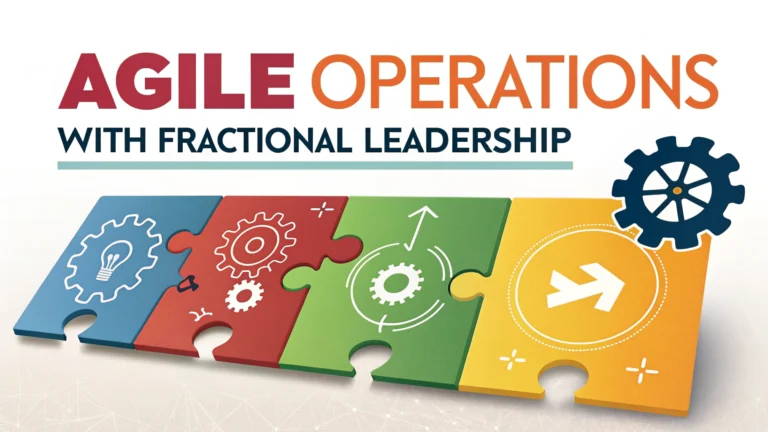Agile operations paired with fractional leadership can transform how businesses scale and adapt in competitive markets.
A fractional COO brings executive-level expertise without the overhead of a full-time hire, making it an attractive option for growing companies.
This guide explores how organizations can leverage fractional leadership to implement agile practices and drive operational excellence.
What is Fractional COO Leadership?
A fractional COO works part-time or on a contract basis, typically serving multiple organizations simultaneously.
- Provides strategic oversight
- Implements operational frameworks
- Manages key business processes
- Optimizes resource allocation
Benefits of Agile Operations with Fractional Leadership
Cost efficiency stands as the primary advantage, with companies paying only for the expertise and time they need.
- Reduced overhead costs
- Access to seasoned expertise
- Flexibility in engagement terms
- Quick implementation of best practices
Implementing Agile Practices Through Fractional Leadership
Successful implementation starts with a clear assessment of organizational needs and goals.
- Define specific operational objectives
- Create metrics for success measurement
- Establish communication protocols
- Set up regular review cycles
Key Areas Where Fractional COOs Add Value
| Area | Impact |
|---|---|
| Process Optimization | Streamlined workflows and improved efficiency |
| Team Development | Enhanced capabilities and performance |
| Strategic Planning | Clear roadmap for growth |
Finding the Right Fractional COO
Look for experienced professionals with a proven track record in your industry.
- Check references and past success stories
- Verify industry experience
- Assess cultural fit
- Review their approach to agile methodologies
Setting Up for Success
Clear expectations and boundaries are essential for a productive relationship with your fractional COO.
- Define scope of work
- Establish reporting structures
- Set communication expectations
- Create milestone markers
Measuring ROI from Fractional Leadership
Track specific metrics to evaluate the impact of your fractional COO.
- Operational efficiency improvements
- Cost savings achieved
- Team productivity metrics
- Project completion rates
Next Steps for Implementation
Start by assessing your organization’s readiness for fractional leadership.
Contact professional networks or leadership consulting firms to find qualified candidates (COO Society, LinkedIn).
Schedule initial consultations with potential fractional COOs to discuss your specific needs and their approach to agile operations.
Building Long-Term Success with Fractional Leadership
Sustainable growth requires ongoing evaluation and adjustment of fractional leadership arrangements.
- Regular performance reviews
- Adaptation of strategies as needed
- Documentation of successful practices
- Knowledge transfer protocols
Scaling Operations Through Agile Practices
Fractional COOs can help organizations scale efficiently by implementing proven agile methodologies.
Key Focus Areas
- Sprint planning and execution
- Cross-functional team coordination
- Iterative improvement cycles
- Scalable process documentation
Risk Management and Mitigation
Effective fractional leadership includes strategic risk assessment and management protocols.
- Contingency planning
- Business continuity strategies
- Compliance oversight
- Security protocol implementation
Technology Integration and Digital Transformation
Modern fractional COOs leverage technology to enhance operational efficiency.
| Technology Area | Business Impact |
|---|---|
| Automation Tools | Reduced manual processes |
| Analytics Platforms | Data-driven decision making |
| Project Management Software | Enhanced team coordination |
Empowering Success Through Strategic Leadership
The fusion of fractional leadership and agile operations creates a powerful framework for sustainable business growth.
- Maintain flexibility in leadership structure
- Foster continuous improvement culture
- Build resilient operational frameworks
- Prepare for future scaling opportunities
Organizations that successfully integrate fractional leadership with agile practices position themselves for long-term success in evolving markets.
FAQs
- What is a fractional COO, and how does it differ from a full-time COO?
A fractional COO is a part-time executive who provides operational leadership to organizations on a contract basis, typically working with multiple companies simultaneously. Unlike a full-time COO, they offer flexible, scalable leadership at a fraction of the cost of a permanent executive. - How can fractional COO services benefit startups and small businesses?
Fractional COOs provide experienced operational leadership without the overhead of a full-time executive, help implement systems and processes, drive growth initiatives, and bring best practices from multiple industries, making them ideal for companies that need expertise but can’t justify a full-time COO. - What are the typical responsibilities of a fractional COO?
Responsibilities include optimizing operational efficiency, developing strategic plans, managing team performance, implementing systems and processes, overseeing project management, improving workflow automation, and ensuring operational goals align with business objectives. - How often does a fractional COO typically engage with a business?
Engagement varies based on company needs, ranging from 8-20 hours per week. They may work on-site or remotely, with regular check-ins and meetings to monitor progress and adjust strategies as needed. - What industries can benefit from fractional COO services?
Any industry can benefit, but fractional COOs are particularly valuable in technology, professional services, manufacturing, retail, and growing startups where operational expertise is needed but full-time leadership isn’t feasible. - How do fractional COOs implement Agile methodologies in operations?
They introduce Agile practices like sprint planning, daily stand-ups, retrospectives, and continuous improvement cycles, adapting these methodologies to fit operational processes and team dynamics. - What is the typical cost structure for fractional COO services?
Costs typically range from $1,500-$5,000 per day or $150-500 per hour, depending on experience level and market. Some fractional COOs work on retainer basis with monthly fees ranging from $3,000-$15,000. - How do you measure the success of a fractional COO engagement?
Success is measured through specific KPIs such as operational efficiency improvements, cost reductions, revenue growth, process optimization metrics, team productivity increases, and achievement of defined organizational objectives. - What is the typical duration of a fractional COO engagement?
Engagements typically last 6-18 months, though some may be shorter for specific projects or longer for ongoing operational support, depending on the organization’s needs and growth stage. - How do fractional COOs handle team management and culture development?
They work to understand existing culture, implement leadership frameworks, develop team capabilities, establish clear communication channels, and create systems for accountability while respecting the organization’s values and vision.







